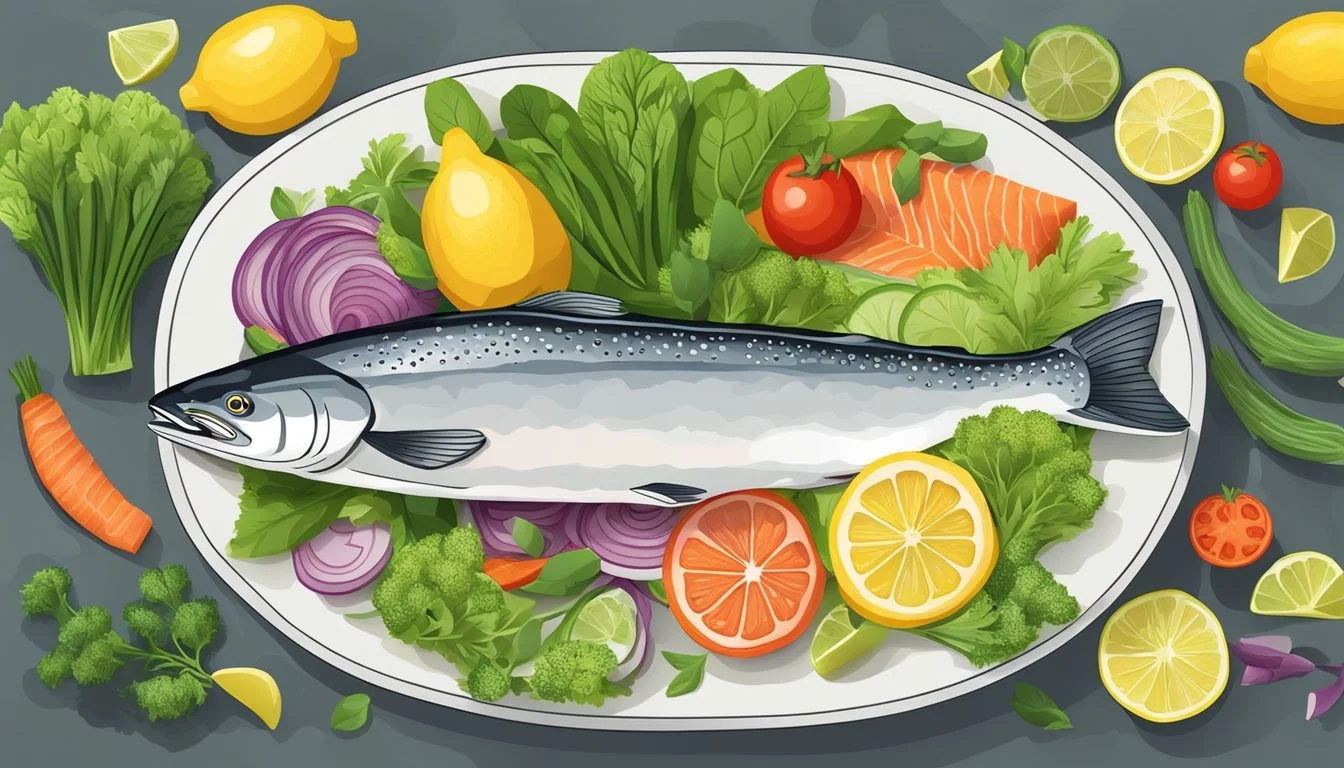What Are the Health Benefits of Salmon?
Exploring Its Nutritional Impact
Salmon is widely regarded as a nutritional powerhouse, offering numerous health benefits. This oily fish is rich in essential nutrients, including omega-3 fatty acids, which are critical for maintaining heart health and are associated with a reduced risk of many chronic diseases. Its impressive profile extends beyond omega-3s, as salmon is also a valuable source of protein and vitamins such as vitamin D and B vitamins, which play vital roles in energy production, maintaining good health, and supporting the body's metabolic processes.
Moreover, salmon contains astaxanthin, a potent antioxidant that not only gives the fish its distinct pink color but also contributes to a host of health benefits, including supporting eye health. The nutritional aspects of salmon are beneficial for a range of bodily functions and structures, from contributing to bone health through its vitamin D content to aiding in the maintenance of healthy skin and hair due to its omega-3 fatty acids. Its balance of vitamins, minerals, and good fats make it a recommended inclusion in a balanced diet.
The accessibility of salmon, whether farmed or wild-caught, along with its versatility in cooking, makes it an excellent dietary choice for those seeking to improve their overall health. Its role in a nutritious diet is complemented by the fact that it can be prepared in a myriad of ways, integrating well into various culinary traditions and preferences while providing substantial health benefits.
Nutritional Profile of Salmon
Salmon is celebrated for its rich nutritional content that supports various aspects of health. It's particularly noted for its high omega-3 fatty acid content along with essential vitamins and minerals that promote heart health, muscle mass, and overall well-being.
Omega-3 Fatty Acids and Heart Health
Salmon contains significant quantities of long-chain omega-3 fatty acids, which include eicosapentaenoic acid (EPA) and docosahexaenoic acid (DHA). A 3.5-ounce serving of farmed salmon packs approximately 2.3 grams of these fatty acids, while a similar portion of wild salmon holds about 2.2 grams.
EPA and DHA are crucial for:
Reducing inflammation
Lowering the risk of cardiovascular diseases
Managing high blood pressure
Preventing arrhythmias
Decreasing the likelihood of strokes
Omega-3 fats are not produced by the body, making it essential to source them from diet, with salmon being an excellent provider.
Protein and Muscle Mass
Salmon is an excellent source of high-quality protein, vital for maintaining and building muscle mass. For instance:
Protein Content: A 3-ounce (85g) serving of wild Atlantic salmon contains about 17 grams of protein.
Adequate protein intake is essential, especially for weight loss, muscle repair after exercise, and overall body function.
Vitamins and Minerals
Besides healthy fats and protein, salmon is a treasure trove of various vitamins and minerals. These nutrients are pivotal for multiple functions such as bone health, immune system support, and cellular metabolism.
Vitamins: Salmon provides notable amounts of Vitamin D, Vitamin B12, and other B vitamins.
Minerals: It is an excellent source of selenium, potassium, calcium, iron, magnesium, zinc, and phosphorus.
The consumption of salmon can contribute significantly to the daily required intake of these essential nutrients. For instance:
Vitamin D: Promotes bone health and immune function.
Vitamin B12: Essential for neurological function and DNA synthesis.
Selenium: Important for thyroid function and antioxidant defense.
In summary, the nutritional profile of salmon makes it a highly recommended food for anyone seeking a diet rich in essential nutrients that promote overall health.
Health Benefits of Salmon
Salmon is recognized for its high nutritional value and a multitude of health benefits. It is especially known for its rich omega-3 fatty acid content, which plays a pivotal role in maintaining cardiovascular health and supporting brain function.
Supporting Brain Function and Mood
The omega-3 fatty acids found in salmon, specifically DHA and EPA, are essential for brain health and cognitive function. They contribute to the maintenance of the nervous system and are linked to a reduced risk of cognitive decline and dementia. Regular consumption of salmon can also impact mood by potentially lowering the risk of depression due to its anti-inflammatory properties.
Omega-3s & Brain Function: Essential for maintaining neural integrity and fluidity.
Mood: Omega-3s may have a positive effect on neurotransmitters linked to mood regulation.
Bone and Joint Health
Salmon is a good source of Vitamin D and calcium, both of which are crucial for bone health and the prevention of osteoporosis. Additionally, with its potent anti-inflammatory effects, courtesy in part to the antioxidant astaxanthin, salmon can help reduce inflammation. This may result in alleviated symptoms for those suffering from conditions like arthritis.
Vitamin D & Calcium: Contributes to bone density and strength.
Anti-inflammatory: Can help lower the incidence of inflammatory joint conditions.
Understanding Salmon Varieties and Their Environment
Salmon are not only appreciated for their omega-3 fatty acid content but also for the wide variety of types available, each with unique environmental contexts. The two main categories of salmon in the market are wild and farmed, both having different implications for sustainability, health, and taste.
Wild vs. Farmed Salmon
Wild salmon thrive in their natural marine habitats, migrating from ocean waters to freshwater rivers to spawn. Wild types like king (chinook), sockeye, coho, pink, and chum each have distinctive habitats and migration patterns. The environmental conditions they grow in to contribute to their taste and nutritional profile, which often includes lower fat content and higher levels of minerals such as selenium, a vital nutrient for bone health and thyroid function.
However, the wild salmon environment is not without its challenges. These fish can be exposed to contaminants like mercury and PCBs, though levels are generally considered lower than those found in farmed salmon. On the other hand, farmed salmon are raised in crowded aquaculture environments, which can lead to higher levels of antibiotics used to treat diseases and pollutants from feed. Farmed salmon typically have a higher fat content, including both omega-3 fatty acids and saturated fat, which can impact cholesterol levels.
It's important to note that while wild salmon are generally viewed as more sustainable and environmentally sound, overfishing and habitat destruction pose significant threats to certain species and regions. Farmed salmon, if managed responsibly, can offer a more reliable supply but must address concerns over sustainability, cross-contamination, and environmental impacts.
Choosing Quality Salmon
Selecting a quality salmon involves understanding labels and knowing whether the salmon is fresh, frozen, canned, or smoked. Fresh salmon should have a moist appearance, a firm texture, and a fresh ocean smell. Frozen salmon can be a good alternative, often flash-frozen at sea to retain nutrients and quality. Canned salmon is convenient and often contains wild-caught fish, which can be preferable for those concerned with contaminants. Smoked salmon, while flavorful, should be consumed in moderation due to added salt affecting cholesterol levels.
When it comes to contaminants, looking for certifications from organizations like the American Heart Association can help consumers choose salmon that meets specific health and sustainability standards. Moreover, labels like "sustainably sourced" or "organically farmed" can indicate better environmental practices and potentially lower levels of antibiotics and pollutants.
In summary, when choosing salmon, consider the environmental impact of the fish's origins, whether it's wild-caught or farmed salmon, and opt for quality sources to ensure optimal health benefits while minimizing exposure to unwanted contaminants.
Frequently Asked Questions
This section answers common queries about the myriad health benefits of salmon, supported by scientific insights.
What nutritional advantages does salmon offer to women's health?
Salmon provides a substantial amount of omega-3 fatty acids that are particularly beneficial for women's health. These fatty acids can support hormonal balance and may play a role in reducing the risk of breast cancer.
Can consuming salmon contribute to weight management or weight loss?
Incorporating salmon into one's diet can aid in weight management or loss. Its high protein content promotes satiety, potentially reducing overall calorie intake, while omega-3 fatty acids may stimulate metabolic rate.
How does salmon intake benefit men's health specifically?
Salmon's omega-3 fatty acids are instrumental for men's heart health, potentially lowering the risk of cardiovascular diseases. Additionally, these fatty acids can support prostate health.
Are there any skin health improvements associated with eating salmon?
The essential omega-3 fatty acids in salmon support skin health by maintaining hydration, reducing inflammation, and potentially protecting against UV-induced damage, leading to improved skin elasticity and overall appearance.
Could you elaborate on the potential health risks associated with salmon consumption?
Consuming salmon, especially farmed variants, can pose health risks due to potential contaminants like heavy metals and polychlorinated biphenyls (PCBs). Choosing wild-caught salmon and moderating intake can help mitigate these risks.
Why might salmon be considered a superfood?
Salmon is often labeled a superfood due to its rich concentration of omega-3 fatty acids, high-quality protein, B vitamins, potassium, selenium, and antioxidants like astaxanthin, which collectively contribute to cardiovascular, cognitive, and joint health.





